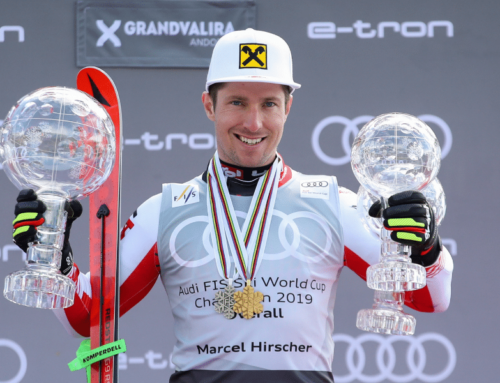Feuz Dominates for Back-to-Back Birds of Prey Downhill Titles
World Cup downhill has been so hotly contested over the past few seasons that it has been rare to see a winning margin greater than a few tenths of a second on the men’s side of the sport. When Switzerland’s Beat Feuz won his second consecutive Beaver Creek downhill title on Saturday by an impressive 0.41 seconds — on a shortened course, no less — heads turned when what he accomplished down the Birds of Prey came fully into focus.
After morning winds affected the upper gliding portions of the course as well as raised concerns around the iconic Golden Eagle jump, FIS officials made the decision to move the start to the lower reserve start in order to have the most fair race possible for the entire field. A downhill that normally runs roughly 1:45.00 seconds from the top would now be shortened by approximately 30 seconds, making the margin for error even smaller for racers hoping to have a successful day.
High cloud cover also added the challenge of flat light. Dark skies made it hard for racers to read small terrain changes as on-course shadows disappeared in a sea of snow and ice. With many top racers veering off line, it was clear that tactics as well as risk were going to be factors for the podium.
Feuz kicked out of the gate wearing bib nine and with surgical precision and the timing of a fine Swiss watch, picked his way down one of the most challenging downhills of the season. The 32-year-old did what he had to do on the top technical section and then hit all his marks on the bottom to pull clear from the field for the biggest winning margin in downhill since Norway’s Aleksander Aamodt Kilde ran away with the Val Gardena downhill by nearly a full second last December. Feuz also won last season’s downhill in Beaver Creek and joined Hermann Maier and Aksel Lund Svindal as the only athletes to win two in a row down the Birds of Prey.
Saturday’s win was also the Swiss team’s second victory in a row after 22-year-old Marco Odermatt’s win in Friday’s super-G.
“I’m really happy that I was able to get the victory two times in a row, also on the shorter track today,” he said through a translator after the race. “Those are two fast names and I am also happy that I can sit here and hopefully make it here next season again. The Swiss team has a good mix of young athletes and older athletes, we push each other with younger athletes like Marco really pushing the older athletes.”
In particular, Feuz was able to separate himself from the rest of the field through the Pumphouse and Harrier Jump sections of the course. The Swiss explained that he experimented with different lines through those key sections during the lone training run on Wednesday.
“I really like this course from the middle part to the finish and I know which line I have to choose, that’s why I am fast,” he added. “It doesn’t matter if we are fast or not in the training, I choose all different lines in training to find the fastest one.”
After Feuz, however, the field was jam-packed with 30th place finishing less than 1.50 seconds behind Feuz’s winning run. Second place was occupied by France’s Johan Clarey and Austria’s Vincent Kriechmayr. Clarey, one month shy of his 39th birthday, also became the oldest downhill podium finisher in World Cup history.

“I don’t have any explanation right now because I wasn’t so confident at the start,” Clarey said after the race. “My super-G yesterday was so bad, it was such bad skiing that today I said to myself, ‘Push and we will see the results.’ I’m pretty surprised with this second place but really happy.”
Even though Clarey is nearing the end of his career, the Frenchman has enjoyed some of his best races in his late 30s as he also finished runner-up in the Kitzbuehel super-G last season.
“I have a lot of experience on this track, it is one of my favorites for sure,” he continued. “I’ve been racing here for about 15 years and I know how everything goes. The experience was on my side today. I’m really proud to be on the podium here, it’s better late than never to be on the podium!”
Kriechmayer was visibly disappointed after his seventh-place performance in Friday’s super-G and was happy to right the ship on Saturday for his first podium of the season. Known as one of the finest technical skiers on the speed circuit, the 28-year-old Austrian was clear that he intends to challenge for crystal globes this season.
“I’m really proud about my result today,” he said. “I made my first points here (in Beaver Creek), my first victory, and now a second place so it’s really nice to be here. I like the flat light. I feel like I can go really aggressive in races like this. I’m really looking to reach for a globe and Beat has been the best downhill skier over the last couple of years and he is the man to beat. If you can beat him, things are looking good for you.”
American fans were treated to a show by Vermonter Ryan Cochran-Siegle, who charged from bib 28 to finish sixth, 0.08 seconds shy of second place and his career-best World Cup finish. Cochran-Siegle set the fastest time in Wednesday’s training run and was one of the only racers to not lose significant time to Feuz in the middle and lower parts of the course.
“I was a little emotional,” he shared in the finish area. “Kind of just pure happiness and joy, you don’t get that often so I’ll take it. I wasn’t planning on being fast in the first training run and after winning that it felt like there was a little more of a spotlight on me so I was just trying to handle it and just show that I can perform on race day, which was pretty huge.”

After the first three Americans out of the gate, Steven Nyman, Bryce Bennett, and Travis Ganong, looked to have miscalculated in some key sections, word was passed to Cochran-Siegle to trust his inspection and let his technical skill shine.
“With the lower start, you could go at Talon Turn a little bit more and really hammer that,” he added. “Bryce’s course report was just to trust the line that I’ve been skiing and I know that I skied the pitch well in the training run so I just tried to do that the same.”
Following Cochran-Siegle in the top 30 was Nyman in 16th place and Jared Goldberg in 22nd. Sam Morse finished just outside of the points in 32nd and Bennett and Ganong finished 39th and 40th, respectively. Kyle Negomir finished 51st, Wiley Maple 58th, and Thomas Biesemeyer 59th.
Canada’s Bridie Sieger also skied himself into an impressive 13th from bib 55 to finish as the top Canadian.
“I was trying my hardest to let my skis run, I know that’s the only way I can be fast,” he told Alpine Canada. “I need to let things go a little. When I crossed the line, I was just overwhelmed with excitement.”
Racing in Beaver Creek concludes on Sunday with the men’s giant slalom.
Top 10
- 1. Beat Feuz (SUI) – 1:12.98 Head/Head/Head
- 2. Johan Clarey (FRA) – +0.41 Head/Head/Head
- 2. Vincent Kriechmayr (AUT) – +0.41 Fischer/Fischer/Fischer
- 4. Hannes Reichelt (AUT) – +0.43 Salomon/Salomon/Salomon
- 5. Adrian Smiseth Sejersted (NOR) – +0.44 Atomic/Atomic/Atomic
- 6. Ryan Cochran-Siegle (USA) – +0.49 Rossignol/Rossignol/Look
- 7. Dominik Schwaiger (GER) – +0.64 Head/Head/Head
- 7. Aleksander Aamodt Kilde (NOR) – +0.64 Atomic/Atomic/Atomic
- 9. Kjetil Jansrud (NOR) – +0.87 Head/Head/Head
- 9. Adrien Theaux (FRA) – +0.87 Head/Head/Head
For complete results, please click here.





















